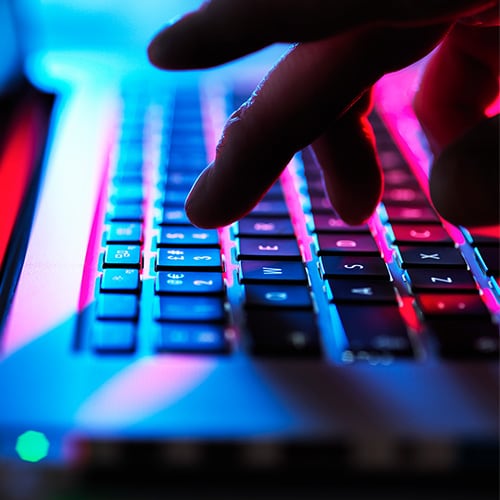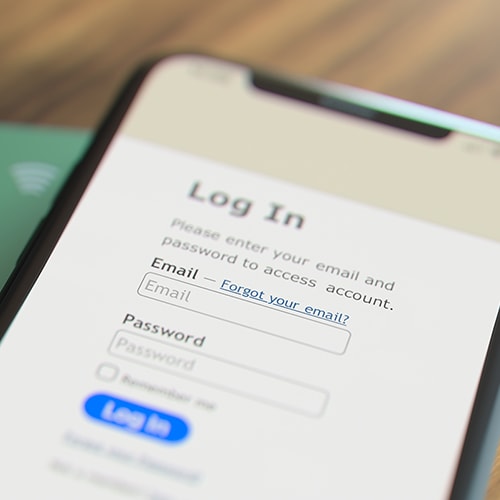What was the Silk Road?
The Silk Road was a short-lived but far-reaching dark web marketplace that surfaced in 2011. The first of its kind, it transcended the boundaries of conventional marketplaces by retaining buyer-seller anonymity and facilitating a global delivery network. Even as new marketplaces cropped up, the Silk Road continued to stand out by allegedly prohibiting the sale of anything items that could “harm or defraud,” meaning that products or services like weapons or assassinations were supposedly off-limits.
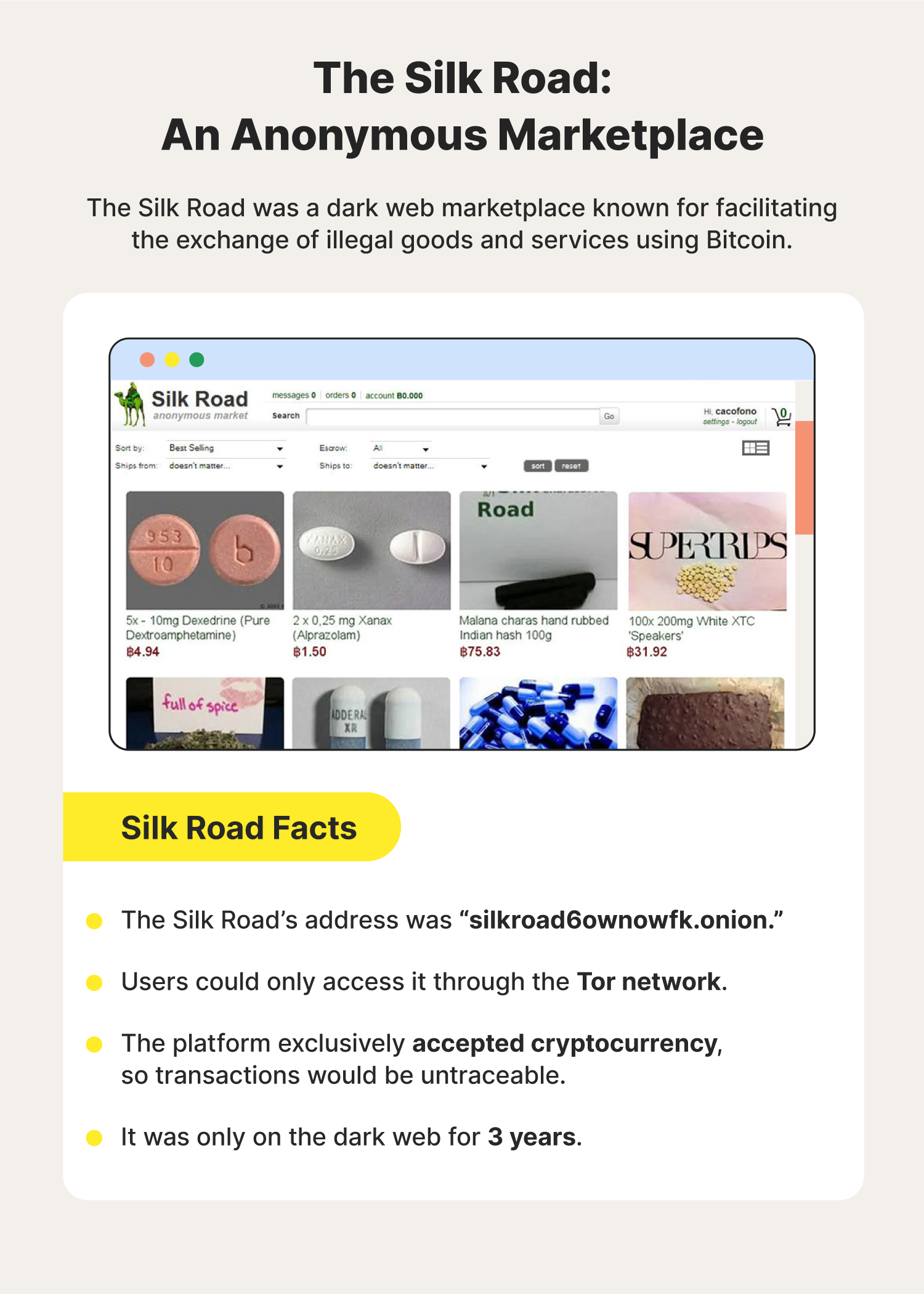
Who created the Silk Road?
The founder of the Silk Road was Ross Ulbricht, who used the pseudonym “Dread Pirate Roberts.” Based on principles of individual freedom and voluntary exchange, Ulbricht launched the infamous Silk Road black market in 2011. It enabled users to exchange illegal goods and services anonymously and without regulations.
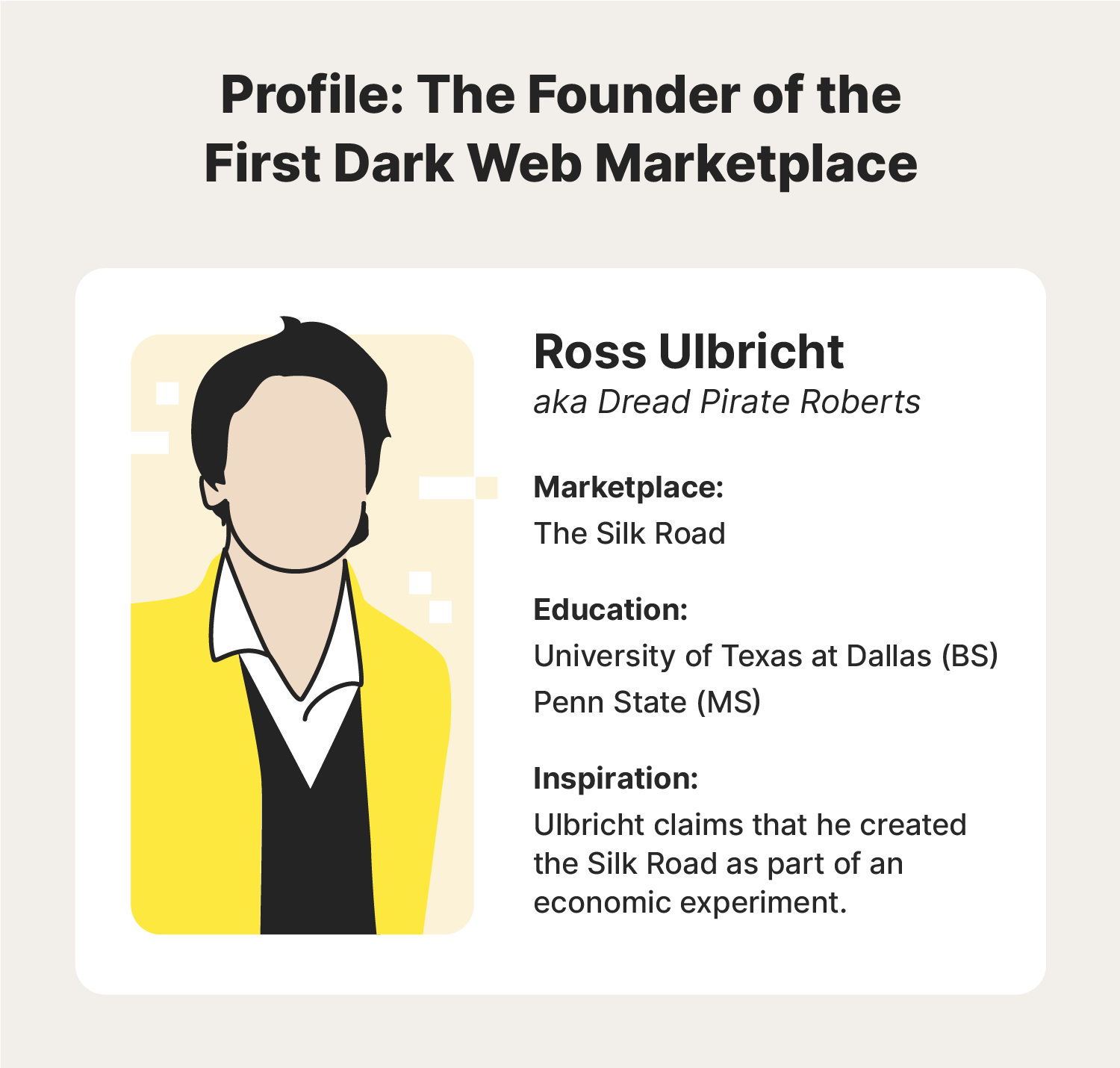
Ultimately, the FBI caught up to Ulbricht at his base in San Francisco, CA, after he made some mistakes that exposed his identity and location, like:
- Vaguely referring to the Silk Road on his personal LinkedIn account
- Using a real photo of himself on the fake IDs he used to rent servers
- Asking for advice on how to build the Silk Road under his real name
The final nail in the coffin was when Ulbricht used the same online account to talk about the Silk Road website and to post a job listing with his email address. That oversight exposed him, and a tax agent identified him in 2011, which led to the seizure of his laptop and Silk Road crypto as well as his eventual arrest and subsequent life sentence.
How did the Silk Road work?
The Silk Road black market could only be accessed by buyers and sellers using the Tor web browser and a compatible search engine. Together, the software would mask IP addresses and encrypt online sessions so people could anonymously post on or browse the now non-operational Silk Road.
The process for accessing and using the Silk Road was as follows:
- Download the Tor browser.
- Choose a dark web-compatible search engine.
- Enter the now-defunct URL (silkroad6ownowfk.onion).
- Browse categories and decide which products to purchase.
- Pay for items with Bitcoin.
After a buyer bought something, their payment was held in escrow to help guarantee that shoppers would receive the agreed-upon goods or services.
What was sold on the Silk Road website?
The Silk Road was best known as a drug superhighway, which earned it names like the “Amazon.com of drugs” and the “eBay of drugs.” However, that’s just the tip of the iceberg.
Shoppers could find nearly any good or service — legal or illegal — as long as the intended purpose wasn’t to harm or defraud. Of course, this guideline did strategically avoid mentioning narcotics and pornography, which were allowed on the Silk Road until its end.
Here are some items that dark web users could buy on the cyber Silk Road:
- Art
- Drugs
- Credit card numbers
- Erotica
- Fireworks
- Forgeries
- Jewelry
- Account logins
- Medical supplies
- Social Security numbers
Some things that were forbidden on the site include:
- Child pornography
- Terrorism or assassination-related offers
- Weapons and ammunition
What happened to the Silk Road?
The online Silk Road officially ended in October 2013, and the 2.0. version known as the New Silk Road went bust in November the following year. Here’s a timeline of key events leading up to, during, and after the Silk Road:
- Feb 2011: The Silk Road launches on the Tor network.
- Oct 2013: The FBI arrests Ross Ulbricht in San Francisco.
- Oct 2013: The FBI shuts down the Silk Road.
- Nov 2014: Blake Benthall creates Silk Road 2.0.
- May 2015: Ulbricht is sentenced to life in prison without parole.
- Nov 2015: The authorities take down Silk Road 2.0.
- Nov 2020: The FBI seizes over $1 billion of Bitcoin associated with the Silk Road.
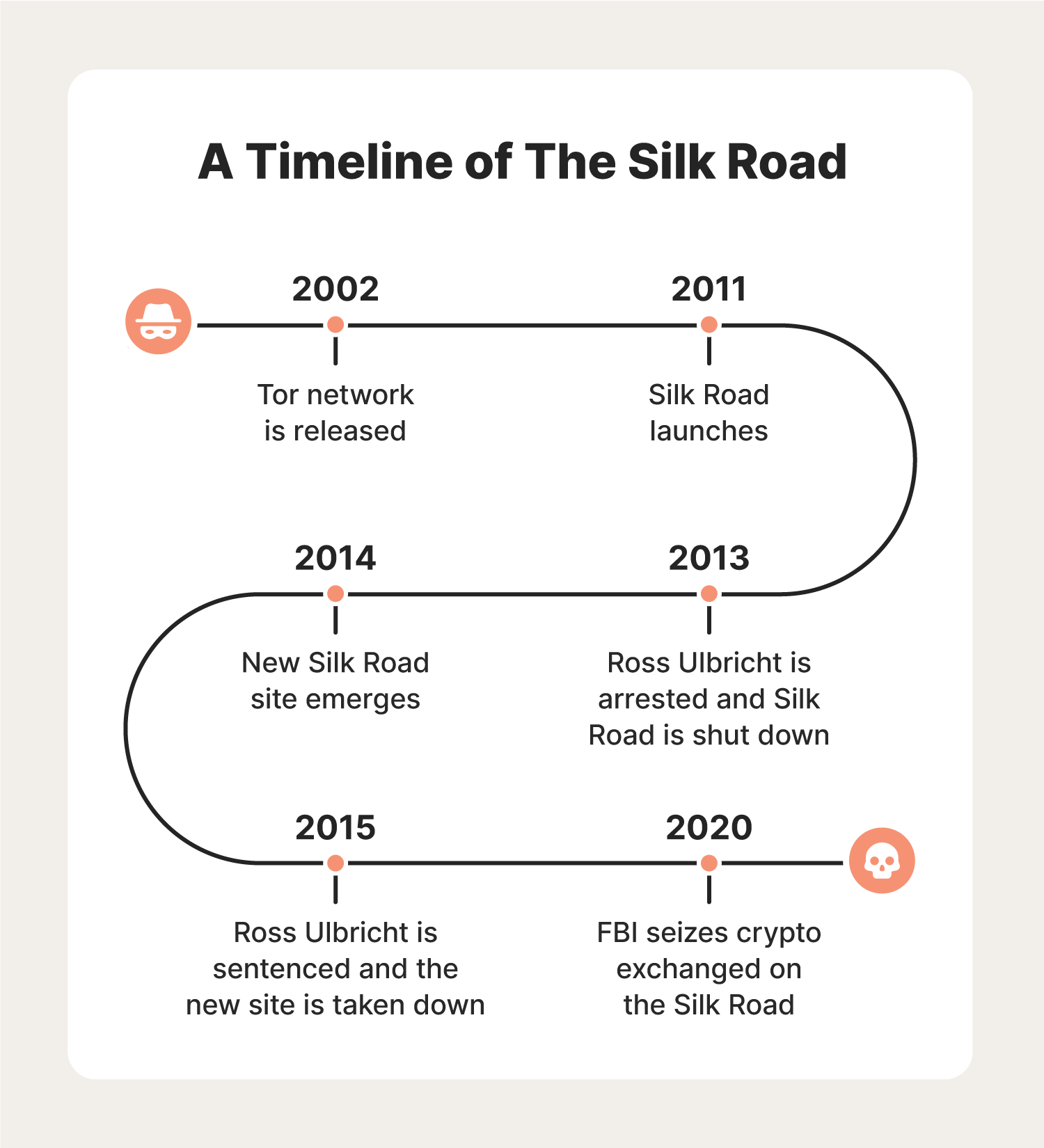
Why did the FBI crack down on the Silk Road?
The FBI moved swiftly to remove the Silk Road (and other illicit online marketplaces) from the dark web because they were flagrantly facilitating online drug sales and other illegal activity. Other marketplaces were taken down due to more direct threats to public safety, like assassination commissions and sex trafficking.
Is there a new Silk Road marketplace?
After the original Silk Road collapsed, Silk Road 2.0 quickly rose to take its spot. However, its time on the dark web was even shorter — ending just one year after its launch. Since then, many new darknet marketplaces have emerged. However, they are incredibly volatile and are often subject to cyberattacks and law enforcement raids.
A few other prominent dark web marketplaces that also sold drugs, stolen data, counterfeit items, and hacking services after the Silk Road ended include:
- AlphaBay
- Black Goblin Market
- Dream Market
- Hydra
- Utopia
- Versus Market
What are the risks of visiting marketplaces on the dark web?
It can be dangerous to visit dark web websites for several reasons — here are a few:
- Legal consequences: If you buy illegal goods, you may face criminal charges.
- Cyberthreats: Darknet marketplaces are infested with bad links and attachments that can download malware onto your device. That can lead to stolen data, identity theft, and account takeovers.
- Financial loss: If you buy something from a marketplace without an escrow feature, you’ll be unable to recover any lost cryptocurrency.
- Psychological impact: One misstep on the dark web can lead you to horrific media that can significantly impact your mental well-being.
- Poor quality: The dark web is unregulated, so items you purchase might not be the quality you expected.
Find out early if your personal information is leaked on the dark web
Whether you venture into the deep dark web yourself or your information ends up there via a data breach, early identity threat detection is key to preventing lasting damage.
LifeLock comes with a range of identity protection tools, including a Dark Web Monitoring feature to notify you if your information is detected on the dark web. If it is, LifeLock will help you take steps to secure your identity and accounts. And if the worst comes to pass, LifeLock will help reimburse you for any money lost due to identity theft and provide expert assistance to help resolve your case.
FAQs about the online Silk Road
Still have questions about the cyber Silk Road? Here’s what you need to know.
Why was the Silk Road illegal if the dark web wasn’t?
The dark web isn’t illegal, because it’s essentially just an anonymous web browser providing a platform for various websites. The Silk Road was illegal because it was primarily a hub for the sale and distribution of illegal items and facilitated other unlawful activity.
Why do governments try so hard to shut down darknet marketplaces?
Governments make significant efforts to shut down darknet marketplaces due to concerns about illegal activities, including drug trafficking, weapons sales, and cybercrime. Shutting down these online marketplaces is a tactic to protect everyday citizens and tamp down on organized crime.
Is my information on the dark web?
Your information might be on the dark web if your data was part of a data breach or hack. You can find out if your personal information makes it to the darknet by following these steps:
- Use a tool like LifeLock that offers dark web monitoring services.
- Monitor your credit report independently or with identity theft protection software to help catch suspicious activity early.
- Use a data breach detection tool to check if your information is exposed.
Editor’s note: Our articles provide educational information. LifeLock offerings may not cover or protect against every type of crime, fraud, or threat we write about.
This article contains
- What was the Silk Road?
- How did the Silk Road work?
- What was sold on the Silk Road website?
- What happened to the Silk Road?
- Is there a new Silk Road marketplace?
- What are the risks of visiting marketplaces on the dark web?
- Find out early if your personal information is leaked on the dark web
- FAQs about the online Silk Road
Start your protection,
enroll in minutes.
LifeLock is part of Gen – a global company with a family of trusted brands.
Copyright © 2026 Gen Digital Inc. All rights reserved. Gen trademarks or registered trademarks are property of Gen Digital Inc. or its affiliates. Firefox is a trademark of Mozilla Foundation. Android, Google Chrome, Google Play and the Google Play logo are trademarks of Google, LLC. Mac, iPhone, iPad, Apple and the Apple logo are trademarks of Apple Inc., registered in the U.S. and other countries. App Store is a service mark of Apple Inc. Alexa and all related logos are trademarks of Amazon.com, Inc. or its affiliates. Microsoft and the Window logo are trademarks of Microsoft Corporation in the U.S. and other countries. The Android robot is reproduced or modified from work created and shared by Google and used according to terms described in the Creative Commons 3.0 Attribution License. Other names may be trademarks of their respective owners.


